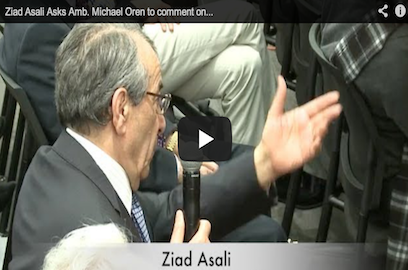Dr. Asali Raises the Issue of Palestine at the Atlantic Council
Dr. Ziad Asali, President and founder of ATFP, commented on remarks delivered by former Israeli Ambassador Michael Oren during a February 10th event at the Atlantic Council. Dr. Asali noted that Amb. Oren did not mention the Palestinian-Israeli conflict in his presentation. Dr. Asali also asked Amb. Oren what advice he would give the Israeli government on how to move forward on the peace talks.
Below is a video clip and a transcript of Dr. Asali’s interaction with Amb. Oren.
Transcript:
Ambassador Michael Oren: “Here’s my friend Ziad... Hope you have something about the Palestinian issue, because no one said anything about the Palestinian issue. Please.”
Ziad:“That’s my point!”
Ambassador Michael Oren:“Okay, good!”
Ziad:Welcome back, welcome back to Washington Mike, it is really a statement of the time and it’s nevertheless fascinating that you went through the whole discourse of yours without really mentioning much about the Palestine-Israel conflict. Even omitting the only part of the US policy that is intensely engaged in the Middle East at this time, with negotiations over Palestine, Israel. Now that you are out of office, and free to speak your mind…you’ve done some of that and I’ve noticed, but…would you care to tell us what kind of an advice you would give the present Israeli government, not the American government, as to how best to maneuver from now on.”
Ambassador Michael Oren:“Well let me say that, first of all, it’s… it’s great to see you Ziad. I mentioned that the inability of the United States to bring about a resolution of the Israel Palestine, conflict, or even aspects of it, I know that the Palestinians were particularly, frustrated with the inability of the administration to maintain the settlement freeze back in 2010, has also impaired America’s influence, and created help and contributed to the image of a waning Pax-Americana in the Middle East. That I, did mention. What I would recommend to the Israeli government, is, avoid...avoid policy steps that would impair Israel’s image not just in the Middle East but in the world, and among segments of the American, public opinion. To do the upmost, to try to exhaust all diplomatic options, to try to achieve peace with the Palestinians. If that fails, to consider measures in the event of an inability of both sides to reach a negotiated permanent two state solution, to think about ways in which of altering the status-quo. Perhaps even unilaterally. Alas, unilateralism has gotten a bad name since the Israel’s withdraw from Gaza in 2005. And to a large extent, legitimately, acquired bad name…there are many mistakes made back then…but, that doesn’t mean that if, Palestinian leaders, and I think that they have to make some immensely painful concessions, I in no ways minimize the concessions that Palestinians have to make, Israel has to make major concessions and take risks, if that proves incapable I think that, Israel can take measures that will minimize the damage to its international, its reputation, maintain Israel’s identity as a democratic and Jewish state and um also enable us to protect ourselves in case the situation in the Middle East, in the West Bank, or elsewhere, further deteriorates.”
TAGS:

















